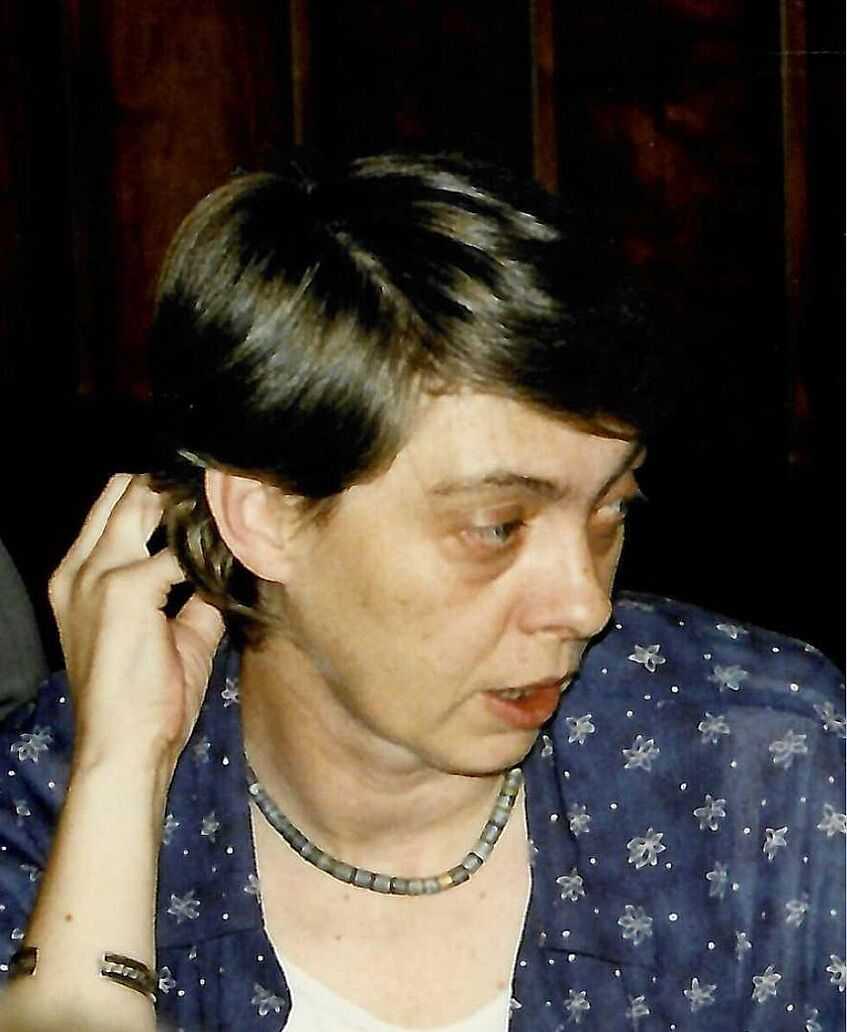
Nachruf Dorothea Sibylla Hoffmann
Nachruf Dorothea Sibylla Hoffmann
von Karin Preisendanz
Dorothea Sibylla Hoffmann, née Zusanek, passed away in April 2001 after a severe illness had been discovered in early 2000, which allowed her to return to work only briefly before her sad demise. She functioned as cashier of the Association from its constitutive meeting in 1989 onwards until March 2000, when she was elected by the members of the Association as deputy cashier, and Himal Trikha to replace her as cashier. Next to her highly responsible official function on the executive board of the Association, Hoffmann substantially contributed to the main agenda of the Association, namely, the production of the books and papers in its two publication series, even before its founding in 1989, that is, already in the context of the De Nobili Research Library. Even though this has not always been acknowledged in writing, she was responsible for carefully preparing and proof-reading the camera-ready copies of the vast majority of publications in the two series, and for the related, often extensive correspondence with the authors from 1973 onwards when she was employed as half-time secretary at the then Department of Indology of the University of Vienna. In this position, she was inter alia also entrusted with the organization of the symposia of the De Nobili Research Library, with the cataloging of the books, and with assigning subject headings to them. Enrolled as a student of Indology since the academic year of 1966/1967, Hoffmann officially continued her studies until the summer term of 1979, but then abandoned them to devote herself fully to her secretarial duties, often working overtime, and to an additional three-year work contract, from 1980 to 1983, for the De Nobili Research Library.
In December 1984, Hoffmann was employed as full-time secretarial and administrative–organizational assistant at the Department (“Institutsreferentin – Dokumentation”). In 1988, she became a tenured secretary (“Amtssekretärin”), and in 1994 she was promoted to the position of the Department’s tenured main administrative officer (“Amtsrätin”).
Her voluminous posthumous papers clearly testify to Hoffmann’s central interest in Indian mythology and legends, from the Ṛgveda all the way to the Epics and even the Purāṇas. In two large ring binders, she had collected in neat handwriting the fruits of her extensive readings in mainly primary, but also secondary literature, lemmatized (1) according to personal names, with cross references to other lemmata and references to the relevant text passages, supplemented by diverse notes and brief sketches of the respective narratives as well as critical comments and questions, and (2) according to the Sanskrit names of animals, plants and places, and to crucial themes, all of which she supplemented in the same way as the lemmatized personal names. This rich collection of materials also documents Hoffmann’s excellent knowledge of Sanskrit.
Hoffmann’s manifold duties, as secretary, administrator, organizer and versatile, highly professional editorial assistant, and in addition – for some five years until 1999 – as the central contact person for the detailed planning of the move of the Department to the new campus, did not allow Hoffmann to continue her own research interests. However, she edited and published posthumously three studies related to ancient mythology and religion by her father, Harald Zusanek (1922–1989), a well-known Austrian writer and author of theatre and radio plays, who was professor at the Department of Film and Television of the College for Music and Performing Arts (Hochschule für Musik und darstellende Kunst) in Vienna:
Rhodos und Helios: Mythos, Topos und Kultentwicklung (1994).
Kalypso: Untersuchungen zum dios-Begriff 1 (1996).
Die Nymphen: Untersuchungen zum dios-Begriff 2 (1998).
Four further volumes were edited by Hoffmann’s brother Michael Zuzanek.
It is obvious that in her intense interest for mythology and religious studies, Hoffmann had been influenced by her father’s scholarly interests. Even though the Association is extremely grateful for her substantial work on its behalf, we regret that she never had the opportunity to publish her own writings. We also remember her as a kind, extremely warm-hearted, helpful and humorous person.
